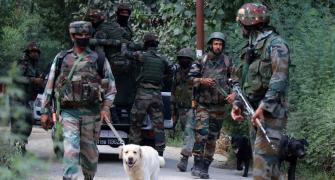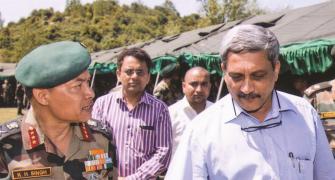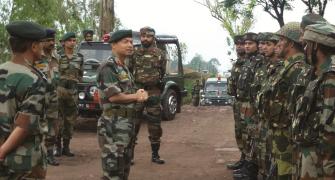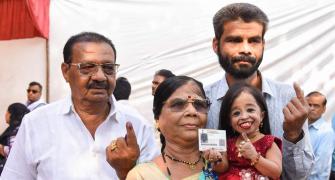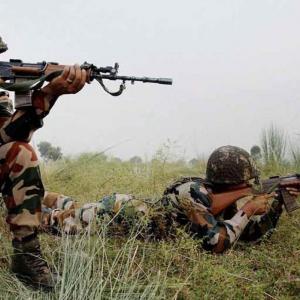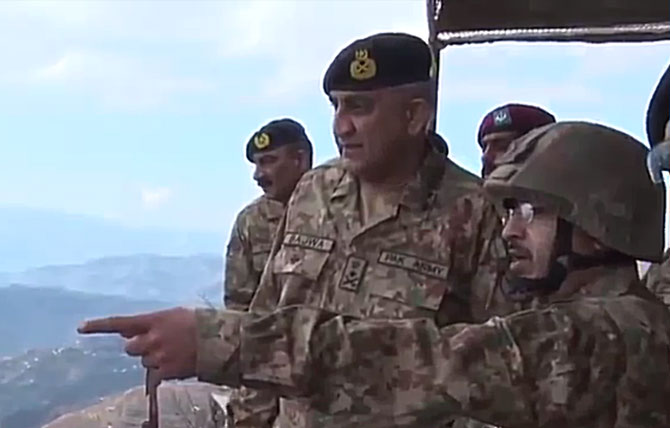It would be realistic to see India's position on the DGMOs joint statement more as 'engagement, different from dialogue', where our subsequent options could be decided depending on the realities of the situation on the ground, notes Rana Banerji, who headed the Pakistan desk at the Research and Analysis Wing, India's external intelligence agency.

The inherent fragility of any attempt at peace-making between two historically hostile neighbours notwithstanding, reiteration by the directors general of military operations of India and Pakistan, on February 26, 2021, of the need for 'strict observance of all agreements' on ceasefire along the Line of Control needs to be welcomed by 'hawks' and 'doves' on both sides.
For any country to be recognised as an effective regional or global power, apart from proven economic strength and military might (processes still in the works for India), good relations with its immediate neighbours should be an important yardstick.
Even as both sides remained caught in a test of wills, during the last few years especially, promoting opposing visions of national interest, India may have been toying with the foreign policy option of resuming a process of engagement with Pakistan, if only to ward off pressure from the new Biden administration, alleging rigidity in our approach.
India's claims of having succeeded in isolating Pakistan diplomatically in international fora may not have succeeded entirely, with possible overplaying of the terrorism sponsorship card.
Against this backdrop, this 'course correction' to change the stalemate may have been warranted.
The nature of the Pakistani State is such that the military establishment there, in contra-distinction to elected politicians, continues to have the veto power to decide vital security and foreign policy responses, especially pertaining to India.
Despite denials by Pakistan's Strategic Assistant to PM Moeed Yusuf about any contacts with Indian interlocutors, it is clear that the Pakistan army was on board this move.
On February 2, while addressing graduating air force recruits in Risalpur, General Qamar Javed Bajwa, Pakistan's army chief, had spoken of a 'time to extend a hand of peace in all directions' and the 'need to resolve' the Kashmir issue in 'a dignified and peaceful manner'.
What is interesting is the timing of this olive branch at a moment when Prime Minister Imran Khan, the military's 'selected protege', is under considerable political pressure domestically.
The Pakistan army may have signaled a possible distancing from hitherto unstinted support with the Inter Services Public Relations suddenly professing non-interference in internal politics!
The recent by-elections in Punjab, Khyber Pakhtunkhwa and Sindh have shown a clear wave of public disgruntlement against the Imran Khan government.
Bail was given to the long languishing Sharif scion, Hamza Sharif, jailed in connection with unproven allegations of funds siphoning.
The election commission of Pakistan surprisingly showed spine by ordering a full re-poll of the openly rigged national assembly 75 Daska turnout.
Even as a supine supreme court considers endorsing the Imran Khan government's ordinance favouring open ballots in the ensuing senate election on March 3, the election commission of Pakistan has stood up for secret ballots.
After the change in Kashmir's status in August 2019, Pakistan espoused more hardline positions internationally, claiming that the Simla process is dead.
It projected that Kashmiris would eventually rise against the yoke of Indian repression.
Though these expectations did not fructify, this would not stop Pakistan from seeking every opportunity to stoke incendiary fires there.
Hardliners in India believe peace missives from Pakistan are mere ploys of old strategic feints to possibly generate complacency within the strategic community and political leadership in India.
Already, Imran Khan has reiterated Pakistan's old postulation on Kashmiri 'self-determination' and put the onus for further progress on India.
Hardline rhetoric from retired diplomats continues to flag the possibility of future nuclear escalation.
Be that as it may, a case remains for purposeful de-escalation on the LoC even if it brings temporary relief to civilian populations residing adjacent to the LoC on either side.
While militancy has been contained and seasonal spurts in State aided infiltration from across are being effectively addressed through a tiered counter-insurgency grid, we have to take effective political measures to ensure that the situation improves in Jammu and Kashmir, so that outsiders cannot take advantage to hurt our interests.
Outreach to disgruntled Kashmiri Muslims, especially youth, to address perceived deprivation of political participation and implementing effective, employment generating development measures remains an uphill task.
Restoration of statehood to Jammu & Kashmir may be on the anvil, after consensus on delimitation of constituencies is reached, but there is no ground to believe this may be enough to satisfy Pakistan.
What makes this rapprochement fragile is both the ensuing seasonal thaw across the LoC when infiltration usually picks up and staging posts become active, as also the imminent elections in India.
As electioneering intensifies here, options to escalate and seek mileage from nationalist rhetoric may be difficult to resist, especially if there are any major terror incidents emanating from either tactically ordained or even rogue operations from spoilers on the other side.
Military re-escalation from the Indian side may have decreasing mileage when claimed impact of our Balakot operation in 2019 has been questioned afresh by authoritative international publications.
These could even be deemed 'false flag' operations by the other side, to put the blame on India.
Even if we do not like it, all issues with Pakistan will have to be resolved bilaterally.
The Kulbhushan Jadhav issue is a case in point.
Though Pakistan suffered a setback in the International Court of Justice at The Hague, it subsequently went through the motions of providing India consular access, albeit in controlled conditions.
It has now claimed that Jadhav did not want to avail of a review process in his trial by Pakistani courts even though he was offered the chance.
It has not agreed to India's request to allow Jadhav assistance of an Indian lawyer.
This has placed India in a dilemma how to respond to the offer of a re-trial in the Islamabad high court.
There could be other unexpected irritants coming up in relations of two geographically adjacent, yet nuclear capable neighbours.
It would be realistic, then, to see India's position on the DGMOs joint statement more as 'engagement, different from dialogue', where our subsequent options could be decided depending on the realities of the situation on the ground.
Subsequent steps on other substantive issues could be decided afterwards, without expectation of too satisfactory outcomes.
There could be a set of incentives and disincentives to determine how and to what extent changes in Pakistan's recalcitrant behavior could be induced.
India's responses can be calibrated instead of remaining confined to a total cut off in ties.
Feature Presentation: Aslam Hunani/Rediff.com

